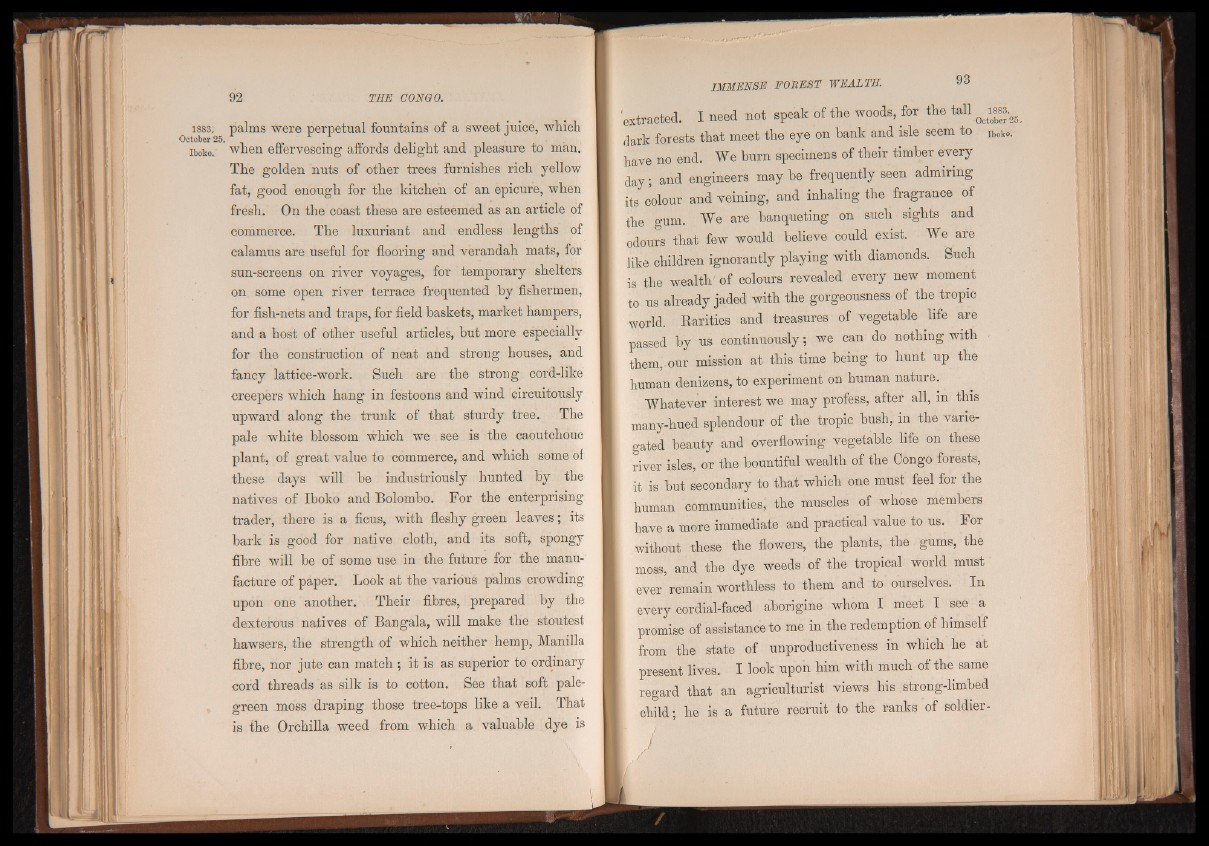
Iboko.
palms were perpetual fountains of a sweet juice, which
when effervescing affords delight and pleasure to man.
The golden nuts of other trees furnishes rich yellow
fat, good enough for the kitchen of an epicure, when
fresh. On the coast these are esteemed as an article of
commerce. The luxuriant and endless lengths of
calamus are useful for flooring and verandah mats, for
sun-screens on river voyages, for temporary shelters
on some open river terrace frequented by fishermen,
for fish-nets and traps, for field baskets, market hampers,
and a host of other useful articles, but more especially
for the construction of neat and strong houses, and
fancy lattice-work. Such are the strong cord-like
creepers which hang in festoons and wind circuitously
upward along the trunk of that sturdy tree. The
pale white blossom which we see is the caoutchouc
plant, of great value to commerce, and which some of
these days will he industriously hunted By the
natives of Iboko and Bolombo. For the enterprising
trader, there is a ficus, with fleshy green leaves; its
bark is good for native cloth, and its soft, spongy
fibre will be of some use in the future for the manufacture
of paper. Look at the various palms crowding
upon one another. Their fibres, prepared by the
dexterous natives of Ban gala, will make the stoutest
hawsers, the strength of which neither hemp, Manilla
fibre, nor jute can match ; it is as superior to ordinary
cord threads as silk is to cotton. See that soft pale-
green moss draping those tree-tops like a veil. That
is the Orchilla weed from which a valuable dye is
'extracted. I need not speak of the woods, for the tall isss.
dark forests that meet the eye on bank and isle seem to
have no end. We burn specimens of their timber every
day; and engineers may be frequently seen admiring
its colour and veining, and inhaling the fragrance of
the gum. We are banqueting on such sights and
odours that few would believe could exist. We are
like children ignorantly playing with diamonds. Such
is the wealth of colours revealed every new moment
to us already jaded with the gorgeousness of the tropic
world. Rarities and treasures of vegetable life are
passed by us continuously; we can do nothing with
them, our mission at this time being to hunt up the
human denizens, to experiment on human nature.
October 25.
Iboko.
Whatever interest we may profess, after all, in this
many-hued splendour of the tropic hush, in the variegated
beauty and overflowing vegetable life on these
river isles, or the bountiful wealth of the Congo forests,
it is but secondary to that which one must feel for the
human communities; the muscles of whose members
have a more immediate and practical value to us. For
without these the flowers, the plants, the gums, the
moss, and the dye weeds of the tropical world must
ever remain worthless to them and to ourselves. In
every cordial-faced aborigine whom I meet I see a
promise of assistance to me in the redemption of himself
from the state of unproductiveness in which he at
present lives. I look upon him with much of the same
regard that an agriculturist views his strong-limbed
• bp. is a future recruit to the ranks of soldier-